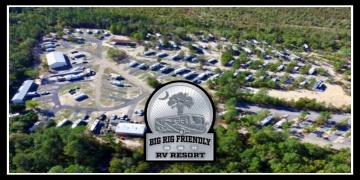Name of Blog
RV Tips Blog
Camping Tips Blog

Environmentally Friendly RV Tips
02-18-2019Eco-friendly RV sounds like an oxymoron. After all, you can’t possibly go green while inside a large gas guzzling camper, right? With a few Environmentally Friendly RV Tips it is possible.
Despite popular belief, traveling inside an RV is an eco-friendly way to see the world. Today’s models are more fuel efficient than ever before. Moreover, people waste far less resources inside an RV than they do at home, where water, electricity and trash are all in abundance.
Still, we can always do better to reduce our carbon footprint. The following tips will help you leave no trace next time you’re on an RV adventure. Check out our favorite tips to transform your regular old RV into an eco-friendly green machine.
Go Dry Camping
Today’s RVs are so decked out in conveniences that they feel like a home away from home. From full kitchens to plasma TVs, modern RVs are practically redefining the word glamping.
It may be difficult to give up these amenities, but dry camping is a great way to be environmentally friendly. By camping without a hookup, you can reduce your energy consumption while enjoying all the benefits of roughing it. Many of the nation’s most scenic national parks offer dry camping where you can connect with nature and cut the cord on using things like generators, AC and sewer tanks. One tip? Find shady spots to park. This will reduce any discomfort on a hot day and help keep your RV cool without needing AC.
Another benefit of dry camping? You can camp for free. Not only can you stay for free on public lands, but you can also stay at private residences free of charge. Organizations like Boondockers Welcome connect campers with a community of RV hosts. It’s like Airbnb for RVers, only without those pricey fees.
Related Read: Boondocking 101
Save Water
Conserving water is one of the easiest ways to go green. That’s especially true when you consider that the average person uses 80-100 gallons of water per day. Saving water, however, oes beyond just taking that super quick shower.
One simple way to reduce your water consumption is to use a water filtration system while camping. This way, you can utilize the water around you and eliminate the need to use harmful water bottles. You can also replace your shower heads and faucets with low flow models, which can help you achieve water savings of anywhere from 25 to 60 percent. These nifty products cost as little as $20 a piece, which is a small price to pay for a massive reduction in water usage.
Related Read: Conserving Water When You Are a Full-timer
Use LED Lights
LED lights are a staple on any list of environmentally-friendly products. These super efficient light bulbs last 3-25 times longer than traditional bulbs.
Replacing your lights with LEDs is one of the most simple and effective ways to go eco-friendly. Not only do they convert more energy into light, they also burn at lower temperatures. As a result, your RV will require less air conditioning because it will stay much cooler.
Want to know the best part? LED lights can actually save you money. They are more expensive than traditional bulbs, but thanks to their extended lifespan and energy efficiency your savings will pay off tenfold in the long run.
Related Read: The Benefits of LED Lighting for Your Coach
Install Solar Panels
Okay, everyone knows that solar panels are eco-friendly. But you might be surprised to learn just how much solar panels can help the environment.
By installing portable solar panels on your RV, you can get all of your power needs in as little as 200-400 watts of energy per day. Moreover, solar power generating systems are more affordable than ever, costing as little as $150. These are a great option for boondockers, as they allow you to go fully off the grid and leave those wasteful gas-powered generators at home. Installing a solar panel will help you reduce your power consumption and keep your RV batteries charged and loaded for your outdoor adventure.
Related Read: Solar Power in your RV (part 1)
Use Enzyme-Based Tank Cleaners
Let’s talk about toilets. Rather, let’s talk about the wonders of the enzyme-based tank cleaner. Toilets are one of the most frustrating parts of RV travel. They require near constant maintenance to keep unfortunate smells at bay. Because RV toilets call for so much maintenance, it’s important to carefully consider how you’re cleaning them. Many chemical based toilet cleaners are made up of hazardous chemicals and pollutants.
Not only are chemical based cleaners dangerous to the environment, they can harm people as well. They’ve been proven to contribute to long-term health effects such as cancer and hormone disruption. Word to the wise? Ditch your toilet cleaner and opt for an enzyme-based tank cleaner instead. These products are free of these pollutants and naturally break down large molecules. This way, you can clean your tank and remove those foul smells without harming the earth.
Maximize Fuel Efficiency
It’s hard to be eco-friendly in an RV, where even the best models max out at 13 miles per gallon. While RVs are known more as gas guzzlers than hybrids, there are a few things you can do to maximize your fuel efficiency.
For one, make sure you’re only packing essentials in your RV. Stick to a basic RV checklist of items to help you avoid weighing down your RV with unnecessary food, water and appliances. You can also increase your efficiency by paying close attention to maintenance. In addition to keeping your engine running like a well-oiled machine, regular maintenance can help keep your tire pressure at optimal levels. In fact, by simply inflating your tires to proper levels you can improve your gas mileage by over three percent.
Really looking to go green? Try using biodiesel fuel instead of diesel. This eco-friendly blend is manufactured from vegetable oils and animal fats. It’s safer than petroleum diesel and it reduces carbon dioxide emissions by up to 74 percent. Though not widely present (yet), there are many gas stations that offer this eco-friendly fuel. Can’t find biodiesel in your neck of the woods? Make sure to use ultra low sulfur diesel to burn fuel with lower emissions.
Adi Hed is a writer and traveling enthusiast. He’s also the co-founder of Tadibrothers, which specializes in Backup Camera Systems and safety equipment for RVs and other vehicles. When he’s not traveling or in the office, he can be found writing on The Tadibrothers blog at https://www.tadibrothers.com/blog/
Comment
Related Blogs

Navigating the Transition from Urban to RV Living
Embarking on a journey from urban to RV living is a thrilling endeavor, filled with promises of freedom and boundless exploration. This lifestyle switch brings a unique chance to disconnect from the rush of city life and plunge into ...

Families Flock to Big Rig Friendly Resort in SC

Internet Options for RVers to Stay Connected
To RVers, the open road and ever-changing landscape provide unparalleled freedom and adventure. However, this lifestyle also brings unique challenges, especially when staying connected. There are plenty of reasons why reliable intern...





